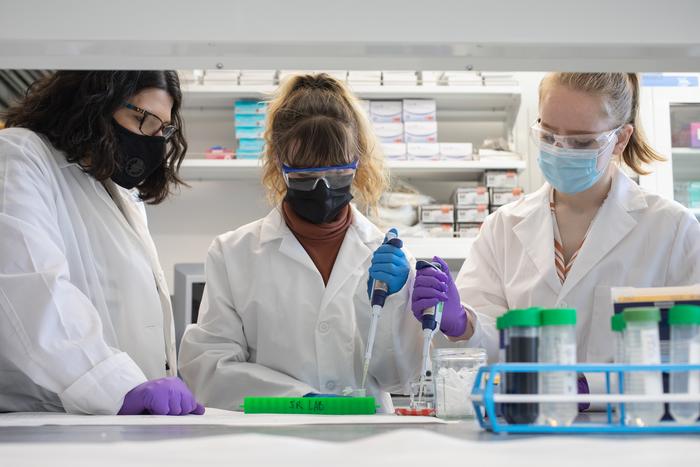KINGSTON, R.I. — Aug. 24, 2023 — Plastics—in particular, microplastics—are among the most pervasive pollutants on the planet, finding their way into the air, water systems and food chains around the world. While the prevalence of microplastics in the environment is well known—as are their negative impacts on marine organisms—few studies have examined the potential health impacts on mammals, prompting University of Rhode Island Professor Jaime Ross’ new study.

Credit: Submitted photo
KINGSTON, R.I. — Aug. 24, 2023 — Plastics—in particular, microplastics—are among the most pervasive pollutants on the planet, finding their way into the air, water systems and food chains around the world. While the prevalence of microplastics in the environment is well known—as are their negative impacts on marine organisms—few studies have examined the potential health impacts on mammals, prompting University of Rhode Island Professor Jaime Ross’ new study.
Ross and her team focused on neurobehavioral effects and inflammatory response to exposure to microplastics, as well as the accumulation of microplastics in tissues, including the brain. They have found that the infiltration of microplastics was as widespread in the body as it is in the environment, leading to behavioral changes, especially in older test subjects.
“Current research suggests that these microplastics are transported throughout the environment and can accumulate in human tissues; however, research on the health effects of microplastics, especially in mammals, is still very limited,” said Ross, an assistant professor of biomedical and pharmaceutical sciences at the Ryan Institute for Neuroscience and the College of Pharmacy. “This has led our group to explore the biological and cognitive consequences of exposure to microplastics.”
Ross’ team—which includes Research Assistant Professor Giuseppe Coppotelli, biomedical and pharmaceutical sciences graduate student Lauren Gaspar, and Interdisciplinary Neuroscience Program graduate student Sydney Bartman—exposed young and old mice to varying levels of microplastics in drinking water over the course of three weeks. They found that microplastic exposure induces both behavioral changes and alterations in immune markers in liver and brain tissues. The study mice began to move and behave peculiarly, exhibiting behaviors akin to dementia in humans. The results were even more profound in older animals.
“To us, this was striking. These were not high doses of microplastics, but in only a short period of time, we saw these changes,” Ross said. “Nobody really understands the life cycle of these microplastics in the body, so part of what we want to address is the question of what happens as you get older. Are you more susceptible to systemic inflammation from these microplastics as you age? Can your body get rid of them as easily? Do your cells respond differently to these toxins?”
To understand the physiological systems that may be contributing to these changes in behavior, Ross’ team investigated how widespread the microplastic exposure was in the body, dissecting several major tissues including the brain, liver, kidney, gastrointestinal tract, heart, spleen and lungs. The researchers found that the particles had begun to bioaccumulate in every organ, including the brain, as well as in bodily waste.
“Given that in this study the microplastics were delivered orally via drinking water, detection in tissues such as the gastrointestinal tract, which is a major part of the digestive system, or in the liver and kidneys was always probable,” Ross said. “The detection of microplastics in tissues such as the heart and lungs, however, suggests that the microplastics are going beyond the digestive system and likely undergoing systemic circulation. The brain blood barrier is supposed to be very difficult to permeate. It is a protective mechanism against viruses and bacteria, yet these particles were able to get in there. It was actually deep in the brain tissue.”
That brain infiltration also may cause a decrease in glial fibrillary acidic protein (called “GFAP”), a protein that supports many cell processes in the brain, results have shown. “A decrease in GFAP has been associated with early stages of some neurodegenerative diseases, including mouse models of Alzheimer’s disease, as well as depression,” Ross said. “We were very surprised to see that the microplastics could induce altered GFAP signaling.”
She intends to investigate this finding further in future work. “We want to understand how plastics may change the ability for the brain to maintain its homeostasis or how exposure may lead to neurological disorders and diseases, such as Alzheimer’s disease,” she said.
The study was published in the International Journal of Molecular Science. It was supported by the Rhode Island Medical Research Foundation, Roddy Foundation, Plastics Initiative, URI College of Pharmacy, George and Anne Ryan Institute for Neuroscience, and the Rhode Island Institutional Development Award (IDeA) Network of Biomedical Research Excellence from the National Institute of General Medical Sciences of the National Institutes of Health.
Journal
International Journal of Molecular Sciences
DOI
10.3390/ijms241512308
Method of Research
Observational study
Subject of Research
Animals
Article Title
Acute Exposure to Microplastics Induced Changes in Behavior and Inflammation in Young and Old Mice
Article Publication Date
1-Aug-2023




